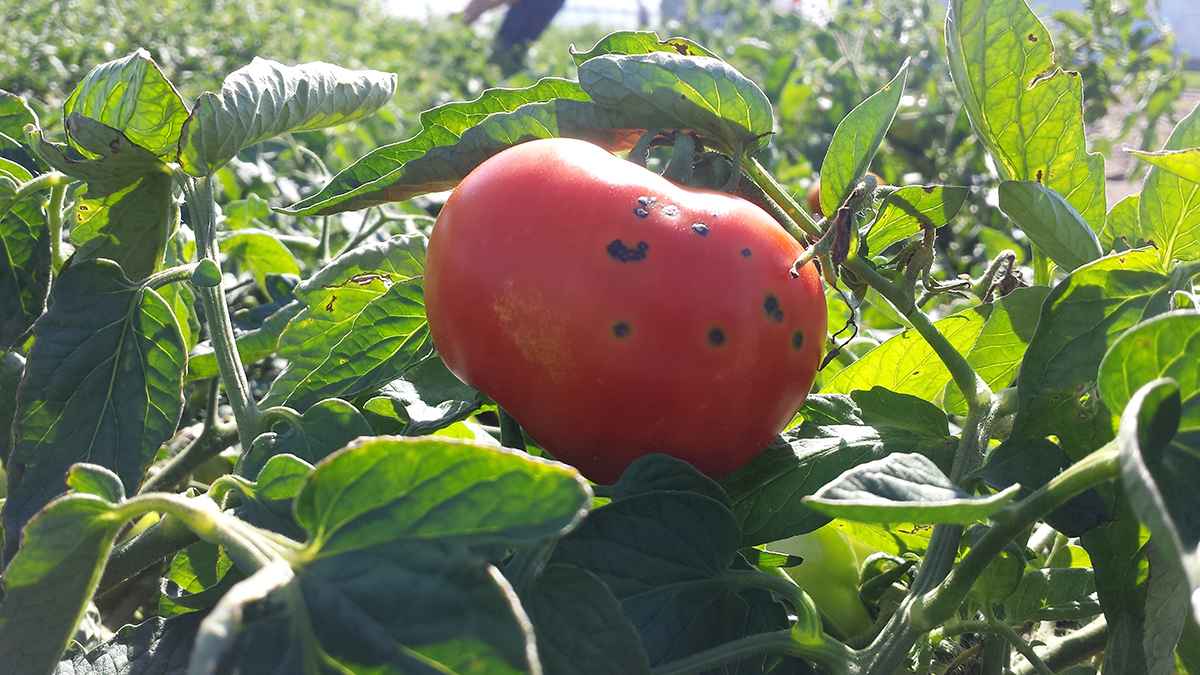Collaboration to identify new disease resistance in tomato

Cornell researchers have been awarded $4.2 million by the National Science Foundation to explore natural genetic variation in the tomato immune system and to use the findings to improve crops in the $1.4 billion annual domestic tomato industry.
The disease bacterial speck, caused by the bacterium Pseudomonas syringae pv. tomato, decreases the marketability and yield of fresh-market and processing tomatoes. More than 20 years of research on tomato immunity and P. syringae virulence at Cornell has resulted in a deep understanding of the molecular players controlling disease resistance and susceptibility.
The new project led by researchers in the Section of Plant Pathology and Plant-Microbe Biology in the School of Integrative Plant Science (SIPS) and at the Cornell-affiliated Boyce Thompson Institute (BTI) looks to identify genes that play a role in plant immunity and introduce them into fresh-market breeding lines, potentially leading to decreased use of pesticides, lowered costs for growers and reduced impact on the environment.
“Diseases in tomatoes have major economic and environmental implications because they decrease yields and require extensive pesticide applications,” said Greg Martin, principal investigator on the project and a professor of plant pathology and plant-microbe biology and the Boyce Schulze Downey Professor at BTI. “By harnessing precise genetic information, the opportunity exists to improve the natural ability of tomatoes to fight off disease. This could be a game-changer that curbs economic losses due to plant disease and creates a more sustainable industry for one of the country’s most popular crops.”
Vast genetic variation exists in wild relatives of tomato, all of which can be crossed to cultivated tomato varieties. In 1993, Martin cloned the Pto resistance gene from tomato while working in the program of professor emeritus Steve Tanksley. Martin’s research program has since uncovered many aspects of the tomato immune response, aided more recently by the complete genome sequence for tomato.
A research group led by Alan Collmer, professor in SIPS, sequenced the genome of P. syringae strain DC3000 in 2001. Collmer, a co-principal investigator on the new project, has been a leader in identifying the many strategies bacterial speck uses to avoid detection by the tomato plant and cause disease.
With the genetic tools now available, researchers have the ability to rapidly uncover new sources of disease resistance. Researchers aim to identify immunity-related genes in heirloom tomatoes by testing their responses to P. syringae strains carrying different combinations of virulence factors.
Tomato genes found to play a role in immunity will be bred into fresh-market breeding lines. Enhanced disease resistance in fresh-market and processing tomatoes could lead to decreased use of pesticides, thus saving growers money, reducing the impact of disease control on the environment and providing food for consumers with fewer pesticide residues.
The project will also focus on the improvement and promotion of the Vegevaders game to entertain and teach high school students and the broader public about plant-pathogen interactions and evolution.
Along with Martin and Collmer, the project funded by the Plant Genome Research Program includes researchers Magdalen Lindeberg of SIPS; Zhangjun Fei and Susan Strickler of the Boyce Thompson Institute; and collaborators at the University of Florida and North Carolina State University.
Media Contact
Get Cornell news delivered right to your inbox.
Subscribe